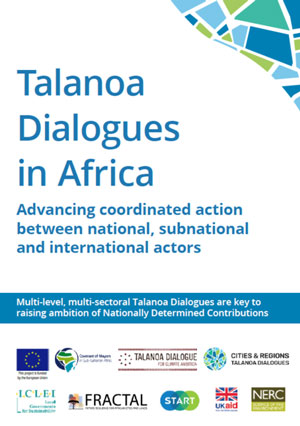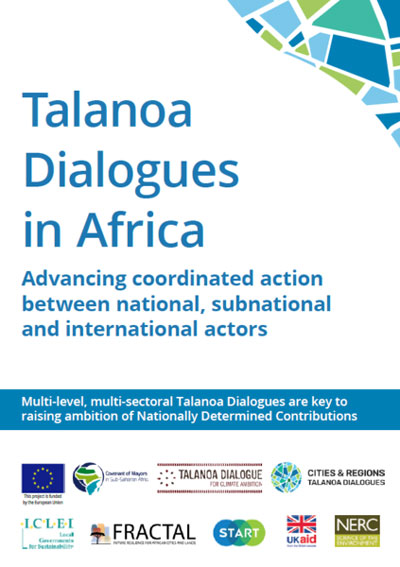22 November 2018
Talanoa Dialogues in Africa: highlighting the value of multi-level governance for climate action



During 2018 ICLEI Africa and partners hosted eight Cities and Regions Talanoa Dialogues in seven African countries. Five key lessons emerged; with two common threads: (1) Coordinated action is essential, and (2) Direct access to climate finance is vital for African cities.
ICLEI Africa was privileged to facilitate rich discussions on climate change, the Paris Agreement and Nationally Determined Contributions in seven African countries. Talanoa Dialogues were introduced during COP23 as a mechanism for national governments to engage with non-party stakeholders with regards to achieving and raising the ambition of their Nationally Determined Contributions. Importantly, Talanoa Dialogues embody an ethos of open, honest and inclusive conversations, which allow for deep conversations to occur between multiple sectors and tiers of government. The Cities and Regions Talanoa Dialogues have a specific focus on enabling discussions related to how cities and towns engage with and contribute to national and international climate change commitments, policies and plans.

The ICLEI Africa team has reflected on the main lessons from the Dialogues and settled on five:
- Coordinated reporting: Subnational governments are already implementing ambitious climate actions, and engagements between national and subnational governments allow these actions to be reported on and profiled for increased uptake.
- Accessing finance: With additional resources and targeted capacity building, successful projects being implemented at the local scale can be scaled-up and developed into bankable projects that attract international finance.
- Building local ownership: With the creation of safe spaces for subnational and national government actors to interact, subnational actors can better align their actions to meet national targets, building momentum from the ground up.
- Identifying capacity strengths and gaps: Coordination and communication, both horizontally between subnational governments and vertically between subnational and national governments, can help multi-scale and multi-sectoral actors build networks and identify technical capacity strengths and gaps that can be built on for implementation of Nationally Determined Contributions.
- Fostering city-to-city learning: Rich sharing of lessons occurs when cities meet to discuss the barriers and enablers they face when implementing climate action. By enabling such engagements that then contribute to the implementation and revision of a country’s Nationally Determined Contribution, not only leads to a more inclusive and transparent Nationally Determined Contribution, but also avoids similar mistakes being made, and increases the harnessing of good practice.
The Cities and Regions Talanoa Dialogues, hosted by ICLEI Africa and partners were made possible via the following projects and funders:
- START, which provides opportunities for training, research, education and networking that strengthens scientific skills and inspires leadership for advancing solutions to critical sustainability challenges.
- The Future Resilience for African CiTies And Lands (FRACTAL) project, funded by the Department for International Development (DFID) and the Natural Environment Research Council (NERC), which aims to advance scientific knowledge about regional climate responses to human activities, and deepen understanding of the decision context and climate knowledge required to contribute to climate resilient development in nine southern African cities
- The Covenant of Mayors in Sub-Saharan Africa (CoM SSA), funded by the European Union, which aims to assist cities in planning for access to affordable, reliable and sustainable energy, while adapting to the effects of climate change.
- Phase II of the Urban Low Emission Development Strategies (Urban-LEDS II) project, funded by the European Union, which aims to support cities globally to reduce greenhouse gas emissions and improve resilience to climate change.
- The Urban Natural Assets: Rivers for life project, funded by the Swedish International Development Cooperation Agency (Sida), through SwedBio at the Stockholm Resilience Centre, which aims to integrate nature-based solutions into land use planning for increased resilience.
To find out more, please download our short publication on these events, that documents their value-add, here.

